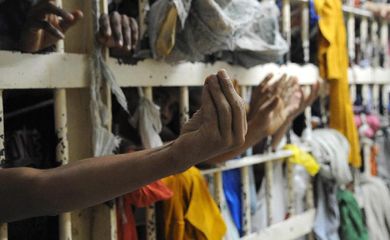Human Rights Watch denounces Pernambuco's chaotic prison conditions


According to the organization, some of the control over overcrowded cells is often given to criminals, who end up subduing fellow inmates. 

The NGO Human Rights Watch (HRW) released a report denouncing the lack of control and hazardous conditions facing prison facilities in Pernambuco, a state in north Brazil. According to the organization, some of the control over overcrowded cells is often given to criminals, who end up subduing fellow inmates.
Known as chaveiro, Portuguese for “keyholder”, as they have the key to prison wards, these prisoners exchange mattresses for money and control drug trafficking inside the penitentiaries. “Keyholders live in private cells, often with televisions, large fans, refrigerators, and bathrooms,” HRW representatives declared after going on a tour through a number of detention facilities in the state.

Overpopulation is associated not only with the shortage of beds but also with poor management, says César Muñoz, author of the study.
Based on data released by the Ministry of Justice, the NGO points out that the prison population in Pernambuco totals 32 thousand people, with beds amounting to no more than 10.5 thousand, making Pernambuco the Brazilian state with the highest level of prison overpopulation. Also, 59% of detainees have not been brought to trial yet.
HRW paid a visit to two prisons in the Curado complex, in the capital city of Recife, and two in Itamaracá, 45km away—the Barreto Campelo Penitentiary and the Agro-Industrial São João Penitentiary (PAISJ, in the original acronym). Interviewed during the visit were directors, public officials, former detainees, and prisoners' family members.
In one of the prisons in the Curado Complex, a cell in the disciplinary ward had six cement beds to serve 60 interns. “the men in that cell, crowded shoulder to shoulder, shirtless because of the intense heat and humidity, endure an overbearing stench of sweat, feces, and mold,” the document reads.
In Itamaracá, the researcher encountered interns sleeping in corridors and shared areas. They sleep, the report says, “in any space they find available in the refectory, including on top of tables and cement benches, and the area between these benches, on the floor.” The penitentiary has enough capacity for 630 inmates but house as many as 2.3 thousand people.
Overpopulation is associated not only with the shortage of beds but also with poor management, says César Muñoz, author of the study. “There are a lot of people in jail who shouldn't be there,” he argues, referring to the amount of people who spend years in prison before awaiting trial or who remain in jail after their sentence is over. In other cases, convicts are eligible for parole, but are still serving in the correctional facility.

Sending pretrial detainees to a separate area is another strategy, which, in Muñoz view, would help reduce violence.
Infrastructure issues were also detected. “In some places, conditions are unbelievable,” Muños says. According to the document, at the PAISJ, “detainees have to collect water in buckets for drinking, washing, showering, and flushing toilets. They go to taps in the yards that have running water only three times daily, for half an hour each time.”
The excessive number of people and unhealthy conditions contribute, the report claims, to risks of a variety of illnesses. Prisons in Pernambuco are plagued with 2,260 cases of tuberculosis among every 100 thousand people—a rate a hundred times higher than Brazil's national average. HIV affects 870 cases in every 100 thousand people—42 times as high as the rest of the population.
In such environments, the study says that detainees are exposed to several forms of violence. The chaveiros cut deals with fellow prisoners to extort money from others and ensure the payment of drug debts. “Prison officials either turn a blind eye or participate in the keyholders’ rackets and receive kickbacks,” the document mentions.
Among the steps that could be taken to tackle the problems, Muñoz advocates the implementation of custody hearings: whenever a case of flagrante delicto takes place, the offender must be heard in up to 24 hours by a judge, who should evaluate whether imprisonment could be replaced with temporary liberty.
Sending pretrial detainees to a separate area is another strategy, which, in Muñoz view, would help reduce violence. The end of the chaveiros is also key. “A detainee must not be given authority over other detainees.”

In such environments, the study says that detainees are exposed to several forms of violence.
The government's response
Pernambuco's Secretariat for Justice and Human Rights released a response to the Human Rights Watch, even though it did not officially receive any reports on the state's prison situation. The government does acknowledge, however, the need for improvement. The statement also says that the secretariat regards the problem with the urgency and responsibility it demands, and that actions “will not be led by social organizations.”
The secretariat further announced that Pernambuco's prison population totals 31,919 detainees and 11,196 beds, and, as other Brazilian states, has been facing a number of challenges, like the need for more professionals working in social reintegration.
Officials also declared that the state government has already implemented custody hearings in Recife, “with figures on the adoption of several penalties alternative to detentions with rates above 39%.” The measure has been ruled by the Supreme Court (STF) across a number of states, as the top court understands that incarceration before conviction should be exceptional.
According to the statement, partnership between the State Secretariat for Health and local health secretariats has strengthened preventive initiatives against tuberculosis in prison, like recruiting medical teams, buying medication and carrying out collective action for the prevention and control of the disease.
The note further mentions that the state has been working to curb'subordination by tightening up inspection procedures, purchasing equipment aimed at weapon control, video surveillance and intelligence, “always having as our goal the observance of prisoners' rights and integrity.”
Translated by Fabrício Ferreira
Fonte: Human Rights Watch denounces Pernambuco's chaotic prison conditions



